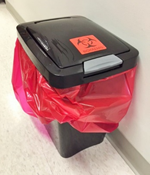Insects Used in Research: Biohazardous Waste Collection, Termination and Disposal Guide for Vanderbilt Researchers
This guidance applies to all insects used in research at Vanderbilt University (VU) and Vanderbilt University Medical Center (VUMC) including, but not limited to: fruit flies, mosquitos, wasps and beetles. Institutionally, VU and VUMC are charged with assuring that all research biological materials (including research insects) are inactivated prior to final disposal to protect the environment beyond the research lab. The procedures below will accomplish this goal and are the preferred methods of collection, termination and disposal for all research insects, transgenic and wild-type.
Collection, Termination and Disposal of Live Insects and Used Insect Media
- All bottles and vials containing live insects, or that once contained live insects, should be disposed of in sealed primary containers to prevent the escape of the insects. (For example, plastic tubes of flies sealed with a cotton plug) These containers should be disposed of in a biohazardous waste receptacle as described in the OCRS Biohazardous Waste: Segregation, Collection & Disposal Guide. The receptacle should be lined with a red autoclave bag marked with the biohazard symbol, leak-proof, marked with a biohazard symbol and closed with a lid when not in active use.
- All flies need to be terminated before final disposal. The preferred method is to place the insects in a -20 °C freezer until no longer viable. The insects can be frozen in their primary containers and then placed in the biohazardous waste receptacle or the biohazard bag containing the insects can be removed from the biohazard waste receptacle, sealed, and placed in the freezer.

This container meets all criteria needed for proper collection of insect waste.
NOTE: Bagged live insects and containers with insect media that once contained live insects should be placed in cold storage for termination at the end of the work day at the latest. It is not acceptable for biohazardous waste containers in the lab to contain live insects for long term storage. - The bagged and cold-treated insect waste can then be disposed of in the same manner as other solid, non-sharps biohazardous waste.
- In the Medical Center, place cold-treated bags in a secondary container inside your lab for pick up by Environmental Services. (Assure that the Environmental Services representative that services your lab knows where your waste will be stored for pickup.)
- If you have your waste collected for treatment and disposal by an outside contractor, place the bagged insect waste into your contractor provided container for disposal.
Collection and Disposal of Insects Terminated in Alcohol
Insects collected in alcohol should not be placed in biohazardous waste for final disposal as flammable substances should not be autoclaved. The container holding the alcohol and insect debris should be leak-proof, wide mouthed, sealable, made of plastic rated to hold the alcohol used, and labeled as “insect waste” with the alcohol solution present (70% ethanol). When ready for disposal, seal the container and attach a completed pink chemical waste tag as you would for disposal of the alcohol. Contact Chemical Safety for a pickup.
IMPORTANT:
- The procedures above are the preferred methods for collection, termination and disposal of experimental insects at Vanderbilt. If the options presented are not technically feasible for your research study design, contact OCRS Biosafety to discuss alternate disposal methods.
- All personnel must follow the PI approved procedures for rearing and feeding of experimental insects. Do not deviate from those procedures without approval from your PI.
- All creation or research use of transgenic insects is subject to the NIH Guidelines for Research Involving Recombinant or Synthetic Nucleic Acid Molecules and therefore requires review and approval by the VU or VUMC Institutional Biosafety Committee.
Questions about Biological Material Disposal?
Please contact OCRS Biosafety at biosafety@vumc.org or call 322-2057 for assistance.